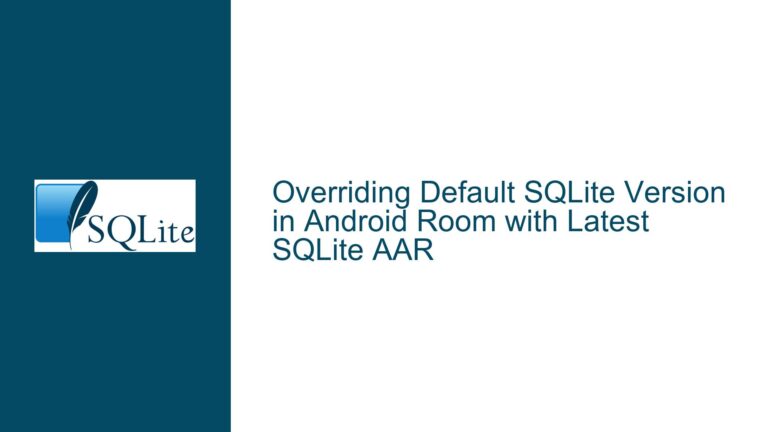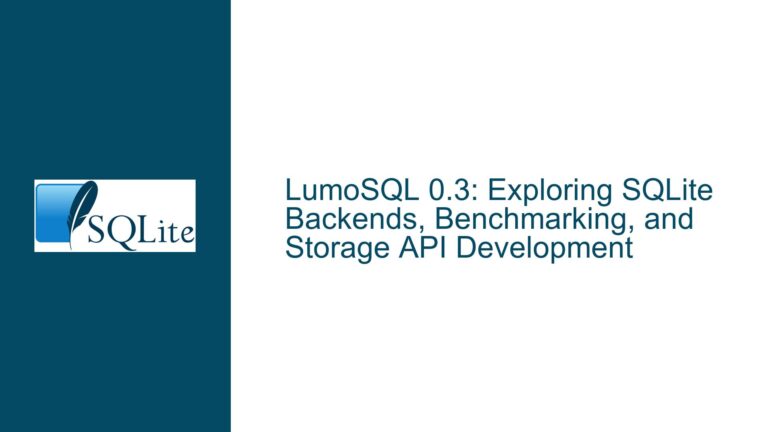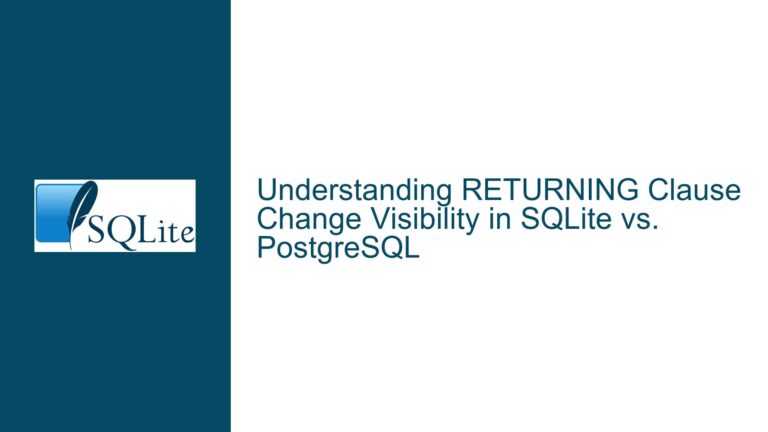Handling Case-Insensitive JSON Key Queries in SQLite: ETL Challenges and Solutions
Issue Overview: Mixed-Case JSON Key Mismanagement in SQLite ETL Pipelines
The core issue revolves around processing JSON data with inconsistently cased keys during Extract-Transform-Load (ETL) operations in SQLite. Legacy systems or applications that serialize JSON with case-insensitive key comparisons (e.g., cJSON-based tools) often produce datasets where keys like "UserId," "userid," and "USERID" coexist. SQLite’s native JSON functions, such as json_extract() or json_object(), treat keys as case-sensitive by default. This creates significant friction during ETL processes when attempting to query or transform JSON data with unpredictable key casing.
For example, a query like SELECT json_extract(data, '$.UserId') FROM records will fail to retrieve values if the key is stored as "userid" in some entries. This inconsistency forces developers to either manually account for all possible key case variations (which is impractical at scale) or implement workarounds that normalize key casing during processing. The problem is exacerbated in large datasets (e.g., thousands of JSON files) where manual intervention is impossible, and automated solutions must handle case mismatches transparently.
SQLite’s current lack of built-in support for case-insensitive JSON key operations necessitates third-party patches or application-layer transformations. While the user’s experimental PRAGMA case_insensitive_json offers a temporary fix, it introduces maintainability risks, especially if implemented globally rather than per-connection. A robust, official solution would streamline ETL workflows and align SQLite’s JSON handling with other case-insensitive systems.
Possible Causes: Legacy Serialization Practices and SQLite’s Case-Sensitive JSON Handling
The root cause of this issue stems from two interrelated factors:
1. Case-Insensitive JSON Key Serialization in Legacy Systems
Applications using libraries like cJSON (which perform case-insensitive key comparisons by default) allow users to inject keys with arbitrary casing over time. For instance, a key like "Email" might be serialized as "email," "EMAIL," or "eMail" across different records, depending on user input or system evolution. This inconsistency becomes entrenched in long-lived datasets, making it difficult to query or aggregate data reliably.
2. SQLite’s Strict Case-Sensitive JSON Functions
SQLite’s JSON1 extension adheres to the JSON specification’s recommendation that keys are case-sensitive. While this aligns with standards, it clashes with systems that treat keys as case-insensitive. Queries using json_extract(), json_set(), or json_each() will only match keys with exact casing, leading to incomplete or incorrect results when applied to heterogeneously cased data.
3. Absence of Native Case-Insensitive JSON Pragmas or Configuration Flags
Unlike other SQLite features (e.g., PRAGMA case_sensitive_like for string comparisons), there is no official mechanism to toggle case sensitivity for JSON key operations. Developers must resort to non-standard workarounds, such as:
- Preprocessing JSON data to normalize key casing before insertion.
- Using SQL functions like
lower()orupper()in queries (e.g.,json_extract(data, '$.' || lower('UserId'))), which fail if keys contain non-alphabetic characters or are nested deeply. - Maintaining shadow columns with normalized JSON or key mappings, increasing storage and complexity.
These solutions introduce performance overhead, code brittleness, or data redundancy, especially in resource-constrained environments.
Troubleshooting Steps, Solutions & Fixes: Normalization Strategies and SQLite Extensions
To address mixed-case JSON key issues in SQLite, consider the following approaches, ranging from immediate workarounds to long-term architectural changes:
1. Pre-ETL Data Normalization
Before importing JSON data into SQLite, preprocess it to enforce consistent key casing. Tools like jq or custom scripts can recursively transform keys to lowercase or camelCase:
# Using jq to lowercase all keys in a JSON file
jq 'walk(if type == "object" then with_entries(.key |= ascii_downcase) else . end)' input.json > normalized.json
This ensures all keys adhere to a single casing convention, eliminating mismatches during queries. However, this approach requires reprocessing existing datasets and may not be feasible for continuously updated data sources.
2. SQLite JSON Functions with Case-Insensitive Lookups
Leverage SQLite’s json_tree() or json_each() functions to dynamically search for keys regardless of casing. For example, to find a key named "email" case-insensitively:
SELECT
json_extract(value) AS email
FROM
records,
json_each(records.data)
WHERE
lower(json_each.key) = 'email';
This query unnests all key-value pairs in the JSON data, converts keys to lowercase, and matches against the target key. While flexible, this method becomes inefficient for large datasets or deeply nested JSON structures due to full scans.
3. User-Defined Functions (UDFs) for Case-Insensitive Extraction
Extend SQLite with a custom UDF that performs case-insensitive JSON key lookups. Using the SQLite C API, register a function like json_extract_ci():
#include <sqlite3.h>
#include <jansson.h> // Or another JSON library
static void json_extract_ci(
sqlite3_context *context,
int argc,
sqlite3_value **argv
) {
const char *json_str = (const char*)sqlite3_value_text(argv[0]);
const char *path = (const char*)sqlite3_value_text(argv[1]);
json_t *root = json_loads(json_str, 0, NULL);
json_t *value = json_deep_case_insensitive_search(root, path); // Hypothetical function
char *result = json_dumps(value, JSON_ENCODE_ANY);
sqlite3_result_text(context, result, -1, sqlite3_free);
}
This UDF would traverse the JSON structure, comparing keys case-insensitively. While powerful, this requires maintaining a SQLite extension and may introduce compatibility issues across versions.
4. Schema Refactoring with Generated Columns
For frequently accessed keys, use generated columns to store normalized versions of JSON values:
ALTER TABLE records
ADD COLUMN email TEXT GENERATED ALWAYS AS (
json_extract(
data,
'$.' || (SELECT key FROM json_each(data) WHERE lower(key) = 'email')
)
) VIRTUAL;
This automatically populates the email column with the value of the first key case-insensitively matching "email." However, this approach scales poorly with numerous keys and increases storage overhead.
5. Proposing an Official PRAGMA case_insensitive_json Implementation
To advocate for a native solution, draft a feature request for SQLite’s JSON1 extension that adds a PRAGMA case_insensitive_json directive. This pragma would modify the behavior of JSON functions to perform case-insensitive key comparisons. The implementation could:
- Add a flag to the
JsonParsestruct in SQLite’s JSON1 code to toggle case sensitivity. - Modify key comparison logic in functions like
jsonLookup()to usestrcasecmp()when the pragma is enabled. - Ensure the pragma is scoped per-connection to avoid threading issues.
Example usage:
PRAGMA case_insensitive_json = ON;
SELECT json_extract(data, '$.UserId') FROM records; -- Matches "userid", "USERID", etc.
This approach would require careful testing to avoid breaking existing applications reliant on case-sensitive behavior.
6. Hybrid Application-Layer Caching
For applications with mixed query patterns, cache JSON keys in a separate lookup table with normalized casing:
CREATE TABLE json_key_mappings (
record_id INTEGER,
normalized_key TEXT,
original_key TEXT,
FOREIGN KEY (record_id) REFERENCES records(id)
);
INSERT INTO json_key_mappings
SELECT
id AS record_id,
lower(key) AS normalized_key,
key AS original_key
FROM
records,
json_each(records.data);
Queries can then join against this table to resolve keys case-insensitively:
SELECT
json_extract(r.data, '$.' || jkm.original_key) AS user_id
FROM
records r
JOIN
json_key_mappings jkm ON r.id = jkm.record_id
WHERE
jkm.normalized_key = 'userid';
While effective, this method duplicates data and complicates write operations.
7. Forking SQLite with Custom JSON Logic
As a last resort, maintain a forked version of SQLite with case-insensitive JSON functions. Modify the jsonLookup() function in json1.c to use case-insensitive comparisons:
static JsonNode *jsonLookup(
JsonParse *pParse, /* The JSON to search */
u32 iRoot, /* Offset of the root node */
const char *zPath, /* Path to search for */
int *pApnd, /* Append nodes to complete path if true */
int bCaseInsensitive /* Whether to compare keys case-insensitively */
) {
// ...
if( bCaseInsensitive && strcasecmp(zKey, zPath) == 0 ){
return pNode;
} else if( strcmp(zKey, zPath) == 0 ) {
return pNode;
}
// ...
}
Expose this via a new pragma or function argument. However, this fork would require ongoing maintenance to track upstream SQLite changes.
By evaluating these strategies against specific use cases—data volume, query patterns, and maintenance capacity—developers can mitigate case sensitivity issues in SQLite JSON handling. For most scenarios, preprocessing data or using json_each() with case normalization offers the quickest path to resolution, while advocating for an official pragma addresses the problem systematically.






